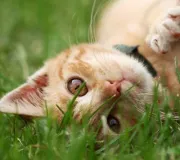Your feline friend may be a bit of a mystery at times. She may race from one end of your Treasure Coast home to another, sleep for a while, become fascinated by a simple toy, and then decide to demand attention. Cats are nothing if not unique, and sometimes they can be a bit challenging to figure out. While cats do meow at us, sometimes quite vehemently, much of their communication is nonverbal.
Flipping Over For Belly Rubs
This is the ultimate sign of Kitty’s trust. It’s also a fairly blatant demand for attention, but we’ll focus on the first meaning. If your feline friend is offering you that furry belly to rub, this mean she completely trusts you. That cute tummy is the most vulnerable spot on a feline body, and therefore is the area they are going to protect the most. Kitty bellies may be a little magical; it’s hard to rub one without smiling.
Rubbing Against Your Legs
Many people assume this endearing habit is a sign of a cat’s affection. While this isn’t exactly incorrect, there’s a bit more to it than that. When Kitty is rubbing against you, she is subtly marking you with her scent, or, in other words, claiming ownership. Cats also have a way of doing this at dinnertime, so it’s also possible that Kitty’s ancestor’s realized this leg rubbing tends to get them fed more quickly.
Tail Position
Kitty’s tail can be a marker of her mood. A cat who is feeling defensive or territorial may ‘poof’ her tail out. If that little tail is twitching just slightly, your feline friend may be irritated or grumpy, but if that tail is lashing back and forth, Kitty is probably angry. A cat whose tail is straight up may be feeling quite sociable or curious.
Blinking
Did you know that when your cat blinks at you very slowly, she is sending you a signal of trust? Cats don’t close their eyes in the presence of danger, or even possible danger, so the slow blink is another way your feline friend is displaying her trust and affection for you.
These are just a few examples of what Kitty is telling you with her body language. She will also communicate verbally, and we do encourage you to talk back. You may have absolutely no idea what she is trying to tell you, but for her part, she may understand more than you think.
Our Advice on How to Understand Your Cat
What does it mean when a cat flips over for belly rubs?
When a cat flips over for belly rubs, it’s a sign of complete trust. The belly is a cat’s most vulnerable area, so exposing it indicates comfort and affection toward you. However, be cautious, as some cats may not like their belly touched and can react defensively.
Why do cats rub against your legs, and what does it signify?
Cats rubbing against your legs is their way of transferring their scent onto you, which is a form of claiming you as their own. This behavior, known as bunting, serves both as a display of affection and a way to claim their territory. It’s also a cat’s method of creating a familiar, comforting environment using their scent.
How can a cat’s tail position indicate its mood?
A cat’s tail position is a crucial indicator of its mood. A raised tail suggests happiness or confidence, while a tucked tail signals fear or submission. The cat may feel threatened or aggressive if the tail is puffed up. A twitching or lashing tail often denotes irritation or anger. Understanding these tail positions can help interpret a cat’s emotional state.
What is the significance of a cat blinking slowly at you?
Slow blinking in cats is a sign of trust and relaxation. It’s often referred to as a “cat kiss.” When a cat blinks slowly at you, it’s showing that it feels safe and comfortable in your presence. Cats are generally cautious creatures, so this gesture indicates a strong bond and affection. It’s a non-verbal way of communicating contentment and trust.
Can cats understand human speech, and should you talk back to them?
Cats may not understand specific words but recognize tone, rhythm, and individual voices. Talking to your cat can strengthen your bond as they become familiar with your voice. Responding to their vocalizations can encourage interaction, making them feel more connected and understood.
Contact us, your local animal clinic in St. Lucie County, FL!


Leave a Reply
You must be logged in to post a comment.